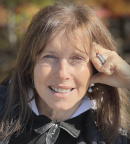When my sister was diagnosed with breast cancer 25 years ago, her medical team suggested we undergo genetic testing for the BRCA gene mutation. I knew that being a BRCA carrier put me at greater risk for breast and ovarian cancers, but I had no idea it also increased my risk for pancreatic cancer. I took the news that I had inherited the gene mutation seriously. When I turned 45, I had a prophylactic oophorectomy and underwent yearly breast cancer surveillance with magnetic resonance imaging (MRI) to detect cancer at its earliest and most curable stage.
So far, breast cancer has eluded me. However, several years ago I learned that my paternal grandfather had died of what was then referred to as stomach cancer, but it was probably pancreatic cancer. Although I’ll never know for sure, it is likely my sister and I inherited the BRCA gene mutation from our grandfather.

Ivy Duneier
Armed with this information and after learning that being a BRCA carrier also put me at risk for developing pancreatic cancer, 4 years ago, I met with Diane Simeone, MD, Director of the Pancreatic Cancer Center and the Early Detection and Prevention Center at the Perlmutter Cancer Center at New York University Langone Health, and the principal investigator and Executive Committee Chair of the Pancreatic Cancer Early Detection (PRECEDE) Consortium. PRECEDE is an international, multi-institutional, observational, prospective study whose aim is to develop strategies for the prevention and early detection of pancreatic cancer and increase the 5-year survival rate from a dismal 10% today to 50% within the next decade (https://precedestudy.org).
Living With the Uncertainty of Cancer
Dr. Simeone asked me to enroll in the study, and I quickly agreed. That decision, I’m certain, saved my life. As part of the protocol of the study, on a rotating yearly basis, I was to undergo an MRI to scan for any early signs of the cancer and an endoscopic ultrasound. I opted instead to have a yearly MRI.
In early 2022, I began experiencing a minor but bothersome pain on the upper left side of my body, which was ultimately diagnosed as acute pancreatitis. The diagnosis worried me, because I have none of the risk factors for the disease. I don’t drink or smoke, and I’ve always maintained a healthy weight.
The diagnosis coincided with my annual appointment with Dr. Simeone, who immediately prescribed a computed tomography scan of my abdomen. Within hours of the test, the results popped up on my patient portal and took my breath away. “Highly suspicious for pancreatic cancer” read the report. After additional tests, including a biopsy of the tissue in the tail of the pancreas, it was confirmed that I had stage 1 pancreatic cancer.
I underwent six rounds of neoadjuvant chemotherapy, then surgery to remove the tail of my pancreas and my spleen, followed by six rounds of adjuvant chemotherapy. I recently completed treatment, and there is no evidence of disease. I don’t like to use the word “cure,” but my prognosis is good, and I’m holding onto Dr. Simeone’s words of encouragement: “You are going to be okay.”
Being Proactive
I credit Dr. Simeone with saving my life. When my gastroenterologist diagnosed my symptoms as pancreatitis, he suggested that I adopt a bland diet to tamp down the inflammation in my abdomen, and that did seem to eliminate the pain. But that didn’t dissuade Dr. Simeone from pursuing the real cause of my discomfort. If I had waited another 6 months to see her, the cancer would have been at a later stage, and my story would have ended very differently. There is no doubt that early detection saved my life.
Living With Gratitude
I have always been a grateful person, but this experience has taken me to a whole new level of gratitude. I’m so fortunate to have a loving group of family and friends who prayed for me throughout this journey, as well as a compassionate and excellent medical team who took such good care of me and never let me sink into self-pity.
Although I’m a person who likes to feel in control of any situation, cancer has taught me that to thrive after my diagnosis, I must surrender to the uncertainties of life, and I’ve learned to let go of the things I cannot control.
Today, I’m on a mission to raise awareness in both the lay and medical communities of the importance of genetic testing for anyone with a family history of cancer and the value of cancer screenings for early detection. There is a verse in the Talmud (Sanhedrin 37a) that I live by: “Whoever saves a single life is considered by scripture to have saved the whole world.”1
Let us together save the world—one patient at a time.
REFERENCE
1. Moskovitz D: Save One Life, Save the Entire World (Including Yourself). Religious Action Center of Reform Judaism, May 24, 2019. Available at https://rac.org/blog/save-one-life-save-entire-world-including-yourself. Accessed May 17, 2023.
Ms. Duneier lives in Boca Raton, Florida.
Editor’s Note: Columns in the Patient’s Corner are based solely on information The ASCO Post received from patients and should be considered anecdotal.

